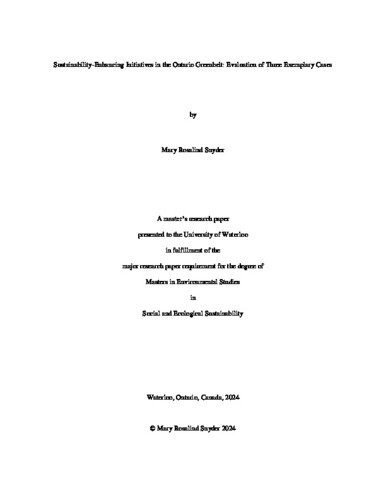| dc.description.abstract | The overwhelmingly complex challenge of intensifying environmental issues and rising social
inequities at all scales, community to global, and the lack of impactful policy and action, contributes
to the negative narrative of the environmental and sustainability field. The severity of the crisis
deserves to be critically analyzed; however, the negative narrative does little to encourage genuine
engagement and motivation for progress. Therefore, the objective of this master’s research paper
(MRP) is to explore stories of positive, creative sustainability initiatives to illuminate examples of
sustainability success and how lessons from these stories can inform sustainability practice. This
MRP examines three case studies, selected through developed criteria, and explored through a
constructed conceptual framework informed by core sustainability concepts in the literature to
account for complexity, interconnectivity, and depth. The Ontario Greenbelt, the focal system,
provides a specific region that is sustainability-minded due to the protection of land, associated
agricultural landscape, and structural support from sustainability organizations, including the
Greenbelt Foundation. Three case studies – the Greenbelt Farmers Market Network, the Alderville
Black Oak Savanna and the Shared Path Consultation Initiative – were selected through application of
explicit sustainability-based criteria and examined through a conceptual framework lens informed by
core sustainability concepts in the literature. Each one is centered on a different dimension of
sustainability. Together they reflect the complexity of the Greenbelt as a social-ecological system.
The reporting uses a storytelling approach, informed through peer reviewed and grey literature,
available documentation about initiative activities and interviews with organizers of the initiatives.
Each case study provides consistent insights into practices that enhance sustainability, including
understanding and appreciating complexity and interconnectivity, supporting community capacity,
networking, and forming respectful relationships, and ensuring equity. Unique lessons from each
initiative were also observed, providing further insight into sustainability thinking and practices given
the social-ecological context of the respective initiative. These stories illustrate the value of focusing
on how sustainability is actively being enhanced within communities and the importance of support
systems like Greenbelt to encouraging sustainability. Implications on the broader literature includes
applications of the framework in examining project in other social-ecological contexts, applying
practices in other communities or larger scales, and encouraging research focused on positive
pathways to progress towards greater sustainability | en |

